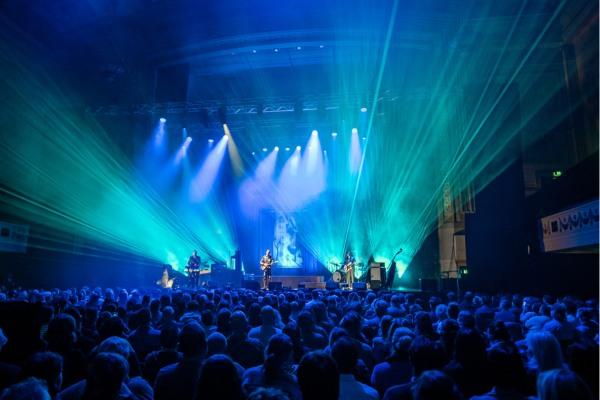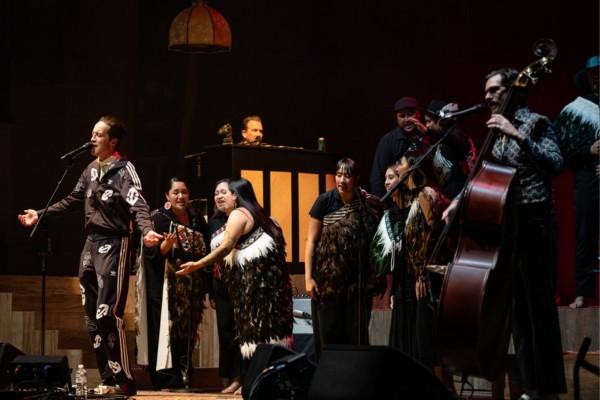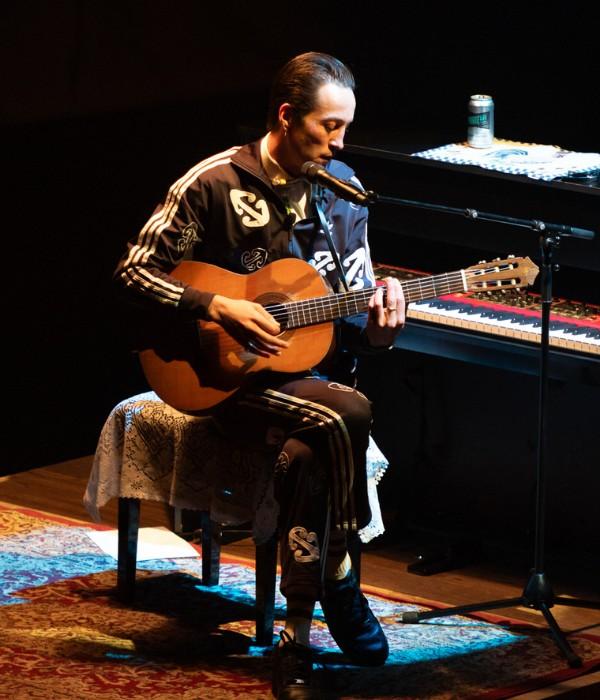Marlon Williams opened the first night of Melbourne's annual winter arts festival RISING with communal gusto at Melbourne Town Hall (4 June).
The Aotearoa/ New Zealand musician is here to tour his fourth studio album, 'Te Whare Tīwekaweka', his first to be written and performed entirely in his ancestral te reo Māori (Māori language).Williams is also in the country to promote 'Ngā Ao E Rua – Two Worlds', a documentary chronicling the making of his April release, which blends country, alt-bluegrass and pop with traditional Māori rhythms.
Flashback to a year ago, and Williams was road-testing some of the unreleased material in an intimate run of shows around Australia. 'An Evening With Marlon Williams' was a change of pace, a humble solo tour that included two nights at a bewilderingly small memorial hall in coastal Victoria. Read our review of the Adelaide concert.
With a stage setup comprising little more than a vintage downlight, tables and glassware, the 2024 tour looked like it took place in Williams' lounge room – proof his golden voice can elicit tears and swoons whether he's wearing a hoodie at an RSL or backed by a choir of ten at Melbourne Town Hall.

Image © Ian Laidlaw
Ngā Mātai Pūrua, a Māori kapa haka (traditional performing art) group from Victoria, joined Williams for his RISING shows. More than just an opening act, they gave cultural context to Williams' album for anyone unfamiliar with Māori musical traditions, and had their lyrics sung back by audience members who were.
They also spoke onstage of the importance of sharing culture and preserving language. By the end of Ngā Mātai Pūrua's welcome, met with raucous applause, I wondered if they might actually upstage Williams – but he had the good sense to summon the singers back out over the course of the night.
Marlon's first appearance to the crowd, however, was in near darkness and solitude. Wearing a black tracksuit embroidered with traditional Kōwhaiwhai patterns, he sung the haunting a cappella 'E Mawehe Ana Au' to a hushed auditorium. This is both the first track on the new album and how Williams has opened his live shows for years.
Bandmates Ben Woolley, Gus Agars and Dave Khan gradually joined Williams onstage for the subdued 'Ko Tēnā Ua' and were lit in a romantic pink for the sweet-sounding 'Me Uaua Kē' and 'Aua Atu Rā'.

Image © Ian Laidlaw
'My Boy' – the title track from Williams' 2022 album – was one of the few English language songs they played from his back catalogue. "Initially, I wanted to keep it to the Māori waiata [songs] off this new album, but actually, I was like: 'No, there have been a few little tendrils that have led to this,'" Williams told the audience, referring to the hints of te reo in his past albums.
"'My Boy' was probably the first song off 'Te Whare Tīwekaweka' actually, in a weird way." Jaunting a few steps up to a raised piano, Williams told more stories under the same downlight from the last tour.
He explained the Maōri legend that informed 'Ngā Ara Aroha', a song about the Whanganui River's formation in the wake of a battle for the love of a woman. "Here's a song about being in love, not getting what you want and then making a river about it," he joked, before devastating the room through song.

Image © Ian Laidlaw
'Korero Maōri' and 'Kei Te Mārama' were sung in exaltation with members of Ngā Mātai Pūrua. In one unexpected turn, an audience plant – 'Daniel' – was hailed onstage to join them on the piano for album highlight 'Huri te Whenua'. Williams bent over and modulated his voice to a low register in what was a standout song of the show.
Based on this night, it's hard to conclude what the best version of an evening with Marlon Williams looks like: Is it him beaming in a Māori chorus? Serenading with his boys (where he was clearly very comfortable)? Or crooning alone in the darkness?
Williams continues to prove adept at pivoting between modes of expression, but also at stitching them together – solo and accompanied; English and te reo; music and acting; heartbreak and levity; reverence to musical traditions and the desire to give them new life.






